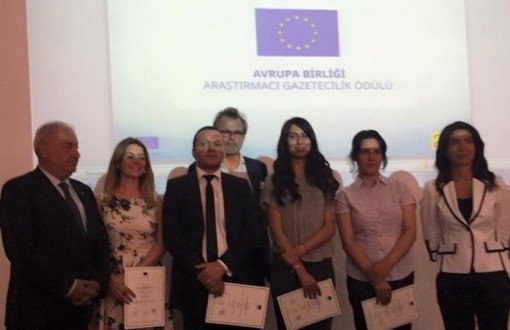Click to read the article in Turkish
The European Union (EU) Award for Investigative Journalism organized by Platform for Independent Journalists (P24) has been handed over in a ceremony held in İstanbul Cezayir Restaurant on May 26.
The first prize has been granted to Hilal Köse for her report published in Cumhuriyet daily with the title “Such an Atrocity Has Never Been Seen” about the violence inflicted on arrested and convicted childs in prison. The second winner was Arda Akın for his report “89 Times Maşallah (Wonderful)” published in Hürriyet daily demonstrating the gold exported by Rıza Sarraf’s company 89 times over and over through fake declarations.
Burcu Karakaş for her report “Suspicious women killings: What is happening in Van?” published on Milliyet daily, and Canan Coşkun, the Cumhuriyet daily correspondent for her report “Scandalous Record” have received equal points and shared the prize for the category “Young Journalist”.
The first winner has received 4,000, the second 3,000 euro and the two winners of the prize category Young Journalists have shared 3,000 euro.
The jury under the presidency of Prof. Arzu Kihtir composed of Hasan Cemal, Tuğrul Eryılmaz, Fikret İlkiz and Cengiz Çandar.
Arzu Kihtir has noted; “The award jury based its decision by evaluating the news stories in regards to chronic wounds in the Turkish society, such as, child abuse in imprisonment, femicides, and misuse of power”.
Yavuz Baydar, a founding member of P24 and National Coordinator of the Awards, said the award recognizes a strong need to support freedom of expression and investigative journalism at a time when journalism is under great pressure in Turkey.
“We need investigative, truthful, bold journalism more than ever to confront even elected leaders who resort to censorship and other methods of restricting freedom of expression. Hopes and trust in democracy can flourish only in countries where investigative journalism is kept alive,” he said.
“Journalism becoming more difficult every day”
Top award winner Köse also said that journalism day by day has become a more difficult profession in Turkey.
“The Kurdish press cohort face imprisonment and the national press face unemployment. We have many reasons to feel hopeless and helpless. It’s been pleasing for me, and I am sure for my colleagues, to have received an award for a news story in such a period,” she said.
Akın, the runner-up, said he faced smear campaigns by journalists from the pro-government media after his front page account of Iranian sanction busting and money laundering appeared.
“I was threatened by some columnists and I face court cases. There is an investigation going on against the inspector who investigated the deals of Zarrab. In the process, we have seen the truthfulness of our reports as Reza Zarrab was arrested in the US. I extend my gratitude to the jury, P24 and the European Union for the award,” he said.
Karakaş, one of those selected in the young investigative journalist category, said that her story prompted the Ministry of Family and Social Policies to collaborate with women’s organizations and universities in Van to research women suicides.
Coşkun, who also received the award in the young investigative journalist category, spoke of having been encouraged even as there was “a clampdown of freedom of expression and the press by government.”
“Good journalism is something to be proud of. We shall endeavor to produce good journalism,” she said.
What is the EU Award for Investigative Journalism?
The award is the brainchild of the South East European Network for the Professionalization of Media of which P24 is a member. It is promoted and sponsored by the European Union Commission.
Similar prizes, funded by the EU Commission have been organized in 6 other EU applicant countries as a means of emphasizing the importance of an independent media for good governance. The prize is made according to strict criteria and procedures set out in a mutually agreed handbook.
The award is intended to arrest the decline of media standards in a region all too accustomed to tacit censorship. “Governments and proprietors often collude in trying to prevent reporters from scrutinizing corruption and abuses of power and corruption. (NV/DG)
* We have compiled this report from Yonca Poyraz Doğan’s report on the website of P24.




